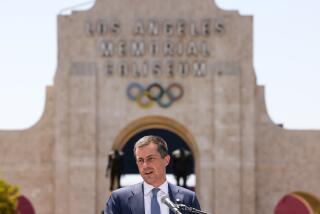MTA Buses to Switch Back to Methanol
- Share via
The Metropolitan Transportation Authority, which converted its trouble-plagued methanol-powered buses to ethanol, is now converting the buses back to methanol.
Thus it goes in the surreal world of the MTA, which has about 150 buses gathering dust in a storage yard at the same time that it is under a federal court order to relieve overcrowding on the buses it operates.
MTA officials are still trying to figure out what to do with the 40-foot lemons parked in a Long Beach yard because of mechanical problems. That leaves about 170 ethanol buses on the street--ones that the MTA plans to convert back to methanol.
In 1995 when the buses were converted from methanol--an alcohol distillate of wood products or produced from natural gas--to ethanol, which is distilled from grain, transit officials expected fewer problems. The methanol buses required engine overhauls every 45,000 miles. But on Thursday, officials said the ethanol buses have been worse--needing overhauls on an average of every 25,000 miles.
“We believed it couldn’t get any worse,” said Richard Hunt, MTA deputy executive officer for transit operations. “We were wrong.”
Repeated breakdowns with the ethanol and methanol vehicles have been blamed for bus service that has worsened to the point that buses on some routes pass riders without stopping.
Officials told the MTA board that the conversion requires a slight adjustment in the engine, costing less than $100 per bus. They also recommended the conversion because methanol is cheaper than ethanol.
“We could save several hundred thousand dollars a month just in fuel usage by going back to methanol,” Hunt said.
The debate on the future of the buses--the Edsels of the MTA fleet--is occurring amid heavy lobbying from fuel suppliers for the lucrative MTA contract. “We’re caught in a fuel fight,” said county supervisor and MTA board member Yvonne Brathwaite Burke. “I can understand. These are big dollars.”
The ethanol fuel supplier has argued that the engine problems stem in part from improper maintenance. The supplier also has complained that the MTA, in buying methanol, might have trouble fulfilling its “Buy America” requirement because much of the other fuel is produced outside the United States. But an MTA official said he did not believe the Buy America provision applied to the fuel purchase.
Mayor Richard Riordan, the MTA board chairman, used the discussion to admonish his colleagues to give the MTA’s interim chief executive officer Julian Burke the latitude to manage the agency. “This is a very complicated issue,” he said. “This is why we have Mr. Burke as the CEO.”
The conversion of the buses back to methanol is seen as a temporary step in a thorny political problem expected to come before the MTA board next month.
The MTA staff is expected to recommend that some of the buses be converted to the more reliable diesel power. But environmentalists are expected to oppose that recommendation because diesel pollutes more than the alternative fuels.
Discussion of the conversion came during a meeting that featured an odd occurrence, even by MTA standards--the drawing of lots among board members to decide who would vote on an issue.
*
Under a new state law, board members are disqualified from voting on items affecting contractors who contribute more than $10 to their political campaigns in the previous four years.
If the board lacks a quorum--as it did in the case of a proposed subway cost increase with eight of the 13 board members declaring conflicts--names are drawn out of a basket to decide which members will vote despite their conflict of interest.
The winners of the drawing approved the increase without debate.
More to Read
Sign up for Essential California
The most important California stories and recommendations in your inbox every morning.
You may occasionally receive promotional content from the Los Angeles Times.














